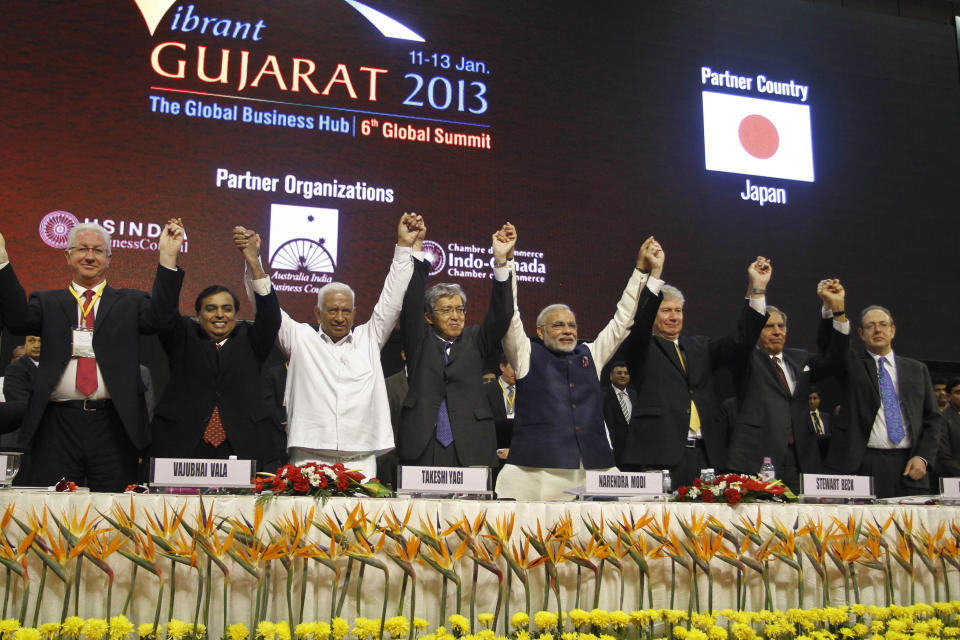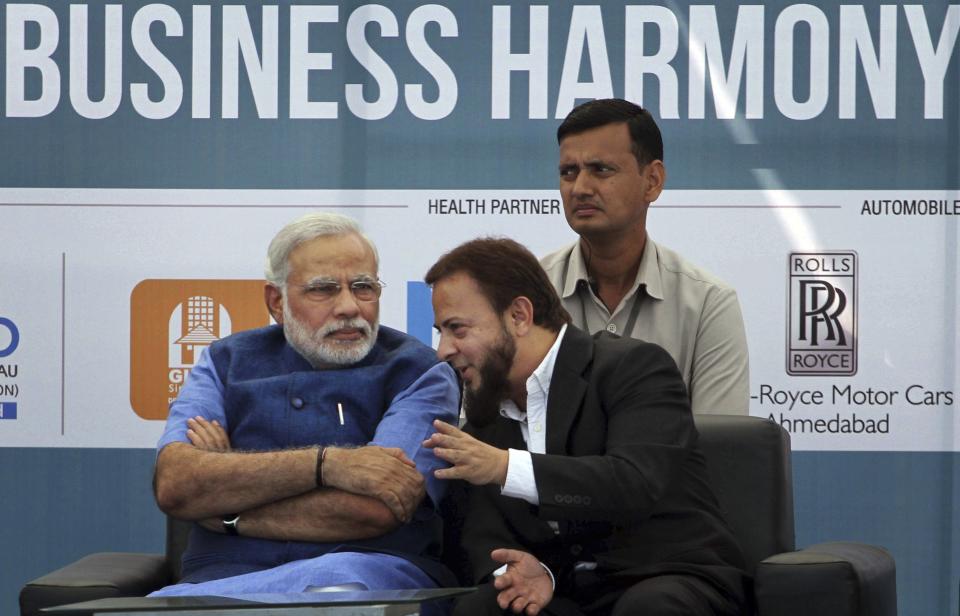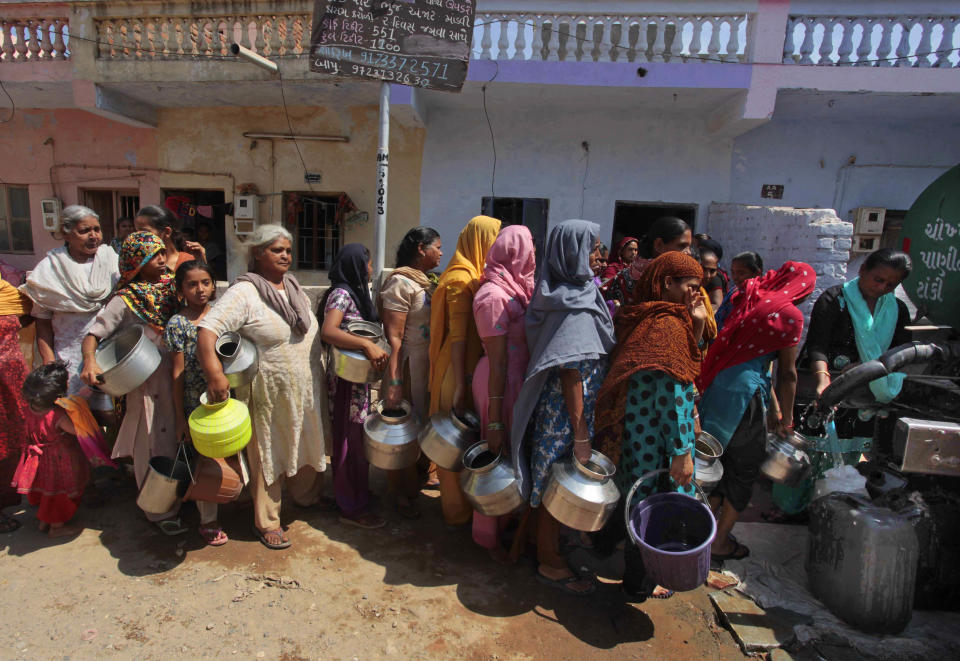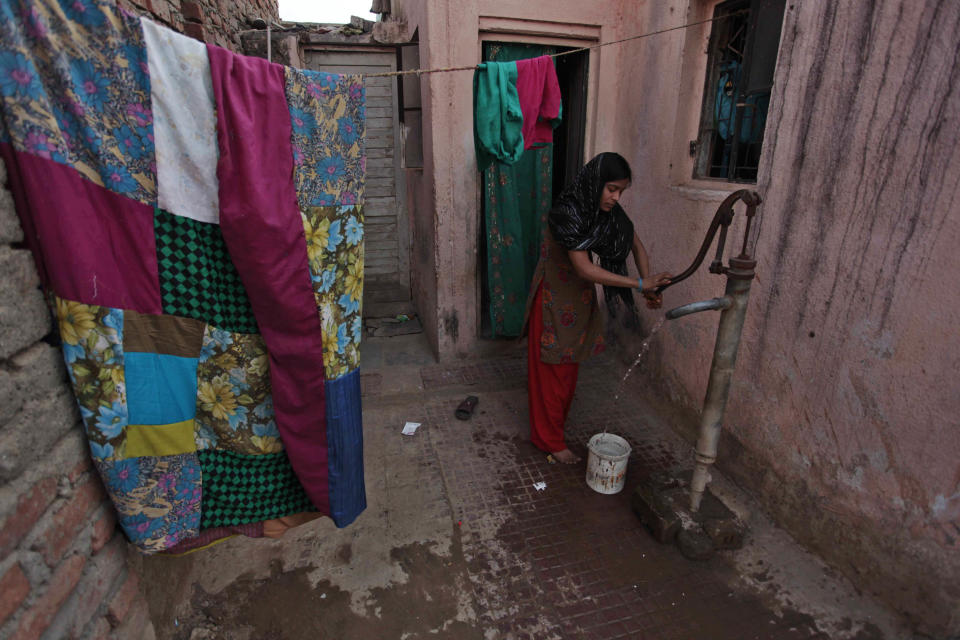Modi touts record on economy in bid to lead India
AHMEDABAD, India (AP) — To some, the man in pole position to be India's next prime minister is a visionary reformer, while to others he's an autocrat in bed with big business cronies. Perhaps nowhere are opinions of Narendra Modi more polarized than in Gujarat, the western state he's led for more than decade and that is now touted as a model of prosperity for all of India to emulate.
As India, Asia's third-largest economy, holds elections that will gauge the mood of millions of new voters, Modi's Hindu nationalist party is proclaiming the economic success of Gujarat. Bharatiya Janata Party faithful say the state's record shows how to re-energize India's sputtering growth, get much needed infrastructure back on track and streamline the tangled bureaucracy that scares away investment.
The state's economic growth averaged 10.3 percent in the decade after Modi took power compared with about 8 percent for India overall. Critics, however, question whether the extra wealth has translated into better lives for the state's 60 million people.
Promoting Gujarat as his personal success story also allows Modi to shift attention from the deaths of more than 1,000 people in anti-Muslim riots under his watch in 2002. Detractors say he didn't do enough to stop the three months of bloodletting by Hindus, the majority faith in India.
Gujarat's wide, smooth highways are one example held up of how the state has gotten things done, while elsewhere in India, new roads are delayed by bureaucratic potholes.
Yet, along one of those freshly asphalted expressways lies the village of Bavaliari, whose inhabitants are less impressed with Modi's record. The farmers were notified in late 2011 that much of the land they have farmed for generations would be seized for a special economic zone under a 2009 land law designed to promote Gujarat's industrial development.
"The authorities told us that we would get development, but I am illiterate. How can I work in a factory?" said Balbhudrasinh Chudasma, whose 27 acres provides a relatively comfortable annual income of 500,000 rupees ($8,300) for the extended family of four brothers. He said replacement land the family was offered is contaminated by seawater.
The Bavaliari farmers have little recourse. The land law decrees that the board's decisions cannot be challenged in any court. For investors, Gujarat's land policy is a godsend. Land acquisition is one of their biggest obstacles, often delaying projects by years.
Gujarat's business friendly approach, sometimes with collateral damage, shows the sharp policy turn that India might make if polls are correct in predicting a BJP victory in the elections that began this week and last until May 12 because of the vast number of voters.
Under the Congress party-led government, India resisted a foreign investment free-for-all, preferring to protect small farmers and local businesses. For more than a decade the formula seemed to work, but now growth has slowed to less than 5 percent and Modi's pro-business rhetoric is sounding good to many.
A charismatic speaker who began life as a humble tea-seller's son and worked his way up through the BJP's ranks, Modi has positioned himself as the election's front-runner. He has capitalized on dwindling job opportunities for the swelling population of young and chronically high inflation that has many Indians aching for change.
The ruling Congress party looks set to lose dozens of seats in parliament. An upstart anti-corruption party, AAP, could siphon votes from the established parties, making a coalition harder to form.
India's business leaders have already made their choice clear. A newspaper's survey of CEOs found 77 percent in favor of Modi as prime minister.
Among the arguments for Gujarat as an economic model: The state added 3,600 kilometers of new roads and electricity was expanded to 90 percent of households by 2011 from 80 percent. That's far above the Indian average of two-thirds of homes with electricity, according to the 2011 census. There was $100 billion in new investment pledges, both foreign and domestic, in 2012 for factories and industries such as solar power, accounting for 22 percent of India's total investment that year.
Businesses say Modi has taken pains to overcome bureaucratic hurdles.
"In three days, you'll get power, water, land clearance. It's like a one-stop center," said Zafar Sareshwala, a Muslim businessman who runs a BMW dealership in Ahmedabad, Gujarat's largest city. Sareshwala said he was a staunch opponent of Modi after the 2002 riots but was won over after meeting him and seeing the results of his infrastructure campaign.
Critics of the Modi economic model, though, say it has an uncanny tendency to enrich some of India's most powerful tycoons.
India's largest port, run by the Adani Group, was established in one of Gujarat's special economic zones that offered the company government-controlled land for pennies per square meter. When Tata Motors decided to locate a factory producing its super-compact Nano car in Gujarat, the state provided the land and a $1.9 billion at 0.1 percent interest.
"This development model is nothing more than land-grabbing by industrialists," said Sagar Rabari, a land-rights activist.
Hemantkumar Shah, an economist at HK College of Arts in Gujarat, aims to deflate what he calls the Modi myth. He said Gujarat grew faster than other states in the two decades before Modi became chief minister.
Critics also say that Gujarat's above-average growth has not translated into significantly better social indicators.
It ranked 11th of 23 states in India's 2011 human development index. The report singled out Gujarat for having a 44 percent child malnutrition rate, similar to states with much lower average income.
Even some supporters doubt whether one state's methods can be spread nationwide by whatever fractious coalition emerges from the election.
And many of the bureaucratic thickets facing business are not decided by the central government. They are the domain, as Modi knows, of states.







